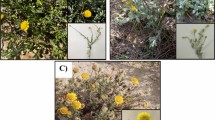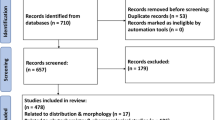Abstract
Fumaria agraria (Fumariaceae) is an annual plant used traditionally in Algeria for various medicinal purposes. Alkaloids extracts from areal parts were subjected to solvent fractionation and GCMS analysis. Rates of alkaloids recorded were respectively of 700 mg/100 g of Dry Weight of total alkaloids “TA”, 400 mg/100 g DWof neutral fraction “NF”, 40 mg/100 g DW of acid fraction “AF” and 250 mg/100 g DWof the basic fraction “BF”. Protopine was found to be the most potent alkaloid of the total extract (41.55%). Fractionation showed that Protopine was found essentially in the BF fraction (60.7%). Antiproliferative activities of total alkaloids extract and BF fraction were assessed on MCF-7 and MDAMB- 231 breast cancer and MCF10A mammary normal cell lines, by trypan blue exclusion essay. Both TA extract and BF fraction showed potent antiproliferative activities against MCF-7 breast cancer cells in varying degrees with respective IC50 of 47.8 ± 1.8 µg/ml and 17.6 ± 0.4 µM, without cell death induction but no impact was observed on normal MCF-10A cell growth. MCF7 Cell line was most sensitive (IC50 of 17,6 ± 0,4µM) to BF fraction effect than MDAMB-231 one (IC50 of 36,4 ± 0,6µM). Isoquinolein alkaloids of Fumaria agraria and specially the fraction which contain Protopine showed potent antiproliferative activity against breast cancer cells.
Résumé
Fumaria agraria (Fumariacae) est une plante annuelle utilisée traditionnellement en Algérie pour divers affections. Les extraits alcaloïdiques des parties aériennes de la plante ont été soumis à un fractionnement par solvant et à une analyse par GC-MS. Les taux d’alcaloïdes enregistrés ont été de 700 mg/100 g de poids sec (PS) pour les alcaloïdes totaux « TA », 400 mg/100 g PS pour la fraction neutre « NF », 40 mg/100 g PS pour la fraction acide « AF » et enfin de 250 mg/100 g PS en ce qui concerne la fraction basique « BF ». La Protopine s’est révélée comme étant l’alcaloïde majoritaire dans l’extrait total TA (41,55%) et comme le principal composant de la fraction BF (60,7%). L’évaluation de l’effet antiprolifératif de ATet FB par le test d’exclusion au bleu trypan, a été menée sur deux lignées cellulaires du cancer du sein MCF7 et MD-MB-231 et sur MCF10A, une lignée cellulaire non tumorale. TA et FB ont démontré tous les deux une activité antiproliférative variable vis-à-vis de MCF7 avec des IC50 respectives de 47,8 ± 1,8 µg/ml et 17,6 ± 0,4 µMsans mort cellulaire observée et sans impact sur la croissance de la lignée cellulaire normale MCF-10A. Par ailleurs la lignée MD-MB-231 s’est montrée moins sensible à l’action de la fraction FB avec une IC50 de 36,4 ± 0,6 µM. Les alcaloïdes isoquinoléïques de Fumaria agraria ont montré un effet antiprolifératif important vis-à-vis de lignées cellulaires de cancer du sein.
Similar content being viewed by others
References
Nobili S, Donatella L, Ewa W, et al (2009) Natural compounds for cancer treatment and prevention. Pharmacol Res 59:365–78
Prashant T, Bimlesh K, Mandeep K, et al (2011) Phytochemical screening and extraction: A review. Int Pharma Scia 1: 98–106
Suau R, Cabezudo B, Rico R, et al (2004) Phytochemical variations within populations of Platycapnos saxicola Willk. J Biocheml Syst Ecol 565–72
Suau R, Cabezudo B, Rico R, et al (2005). Identification and quantification of isoquinoline alkaloids in the genus Sarcocapnos by GC-MS. Phytochem Anal 16: 322–7
Goetz P, Ghedira K, Le Jeune R (2009) Fumaria officinalis L (Fumariacées), matière médicinale pratique. Phytothérapie 7: 221–5
Maiza-Benabdesselam F, Khentache S, Bougoffa K, et al (2007a) Antioxidant activities of alkaloid extracts of two Algerian species of Fumaria: Fumaria capreolata and Fumaria bastardii. Rec Nat Prod 1(2-3): 28–35
Singh A, Duggal S, Kaur N, et al (2010) Berberine alkaloid with wide spectrum of pharmacological activities. J Nat Prod 3: 64–75
Susplugas J, Massa V, Susplugas P (1975) Fumeterres en Languedoc Roussillon. Anales del Instituto Botánico A J Cavanilles 32(2): 233–9
Souseck J, Guedon D, Adam T, et al (1999). Alkaloids and organic acids content of eight Fumaria species. Phytochem Anal 10(1): 6–11
Patwardhan B, Partwardhan A (2005) Traditional Medicine: Modern Approach for affordable global health. World Health Organization
Mohd Fadzelly A, Maryati M, Asmah R, et al (2010) Cytotoxicity, cell cycle arrest, and apoptosis in breast cancer cell lines exposed to an extract of the seed kernel of Mangifera pajang (bambangan). Food Chem Toxicol 48: 1688–97
Mukherjee A K, Basu S, Sarkar N, et al (2001) Advances in cancer therapy with plant based natural products. Curr Med Chem 8: 1467–86
Hu J P, Nishishita K, Sakai E, et al (2008) Berberine inhibits RANKL-induced osteoclast formation and survival through suppressing the NF-kB and AKt pathways. Eur J Pharmacol 580 (1-2): 70–9
Suau R, Cabezudo B, Rico R, et al (2002a) Direct determination of alkaloids contents in Fumaria species by GC-MS. Phytocheml Anal 13: 361–3
Akhtar F (1997) Isolation and structural studies on the chemical constituents of Withania somnifera & Fumaria flabellata and X-ray diffraction studies. Ph. D. dissertation, University of Karachi, Pakistan
Suau R, Cabezudo B, Rico R, et al (2002b) Alkaloids from Fumaria sepium and Fumaria agraria. Biochem Sys Ecol 30: 263–5
Maiza-Benabdesselam F, Chibane M, Madani K, et al (2007a) Determination of isoquinoline alkaloids contents in two Algerian species of Fumaria (Fumaria capreolata and Fumaria bastardii). Afr J Biotechnol 6: 2487–92
Chun-Han C, Cho-Hwa L, Ya-Ling C, et al (2012) Protopine, a novel microtubule-stabilizing agent, causes mitotic arrest and apoptotic cell death in human hormone-refractory prostate cancer cell lines. Cancer Lett 315: 1–11
Bandana C, Ranjani M, Jawed AS, et al (2012) In vitro antibreast cancer activity of ethanolic extract of Wrightia tomentosa: Role of pro-apoptotic effect of oleanolic acid and urosolic acid. J Ethnopharmacol 142: 72–9
Jin-Jian L, Jiao-Lin B, Xiu-Ping C, et al (2012) Alkaloids Isolated from Natural Herbs as the Anticancer Agents. Evidence-Based Complementary and Alternative Medicine ID 485042: 12
Kim A, Yu B, Koa KW, et al (2010) The alkaloid Berberine inhibits the growth of Anoikis-resistant MCF-7 and MDA-MB-231 breast cancer cell lines by inducing cell cycle arrest. Phytomedicine 17(6): 436–40
Guamán Ortiz LM, Lombardi P, Tillon M, et al (2014) Berberine, an Epiphany Against Cancer. Molecule 19: 12349–67
Chun JW, Lan Xiang W, Li Juan F, et al (2013) Genomic screening for targets regulated by berberine in breast cancer cells. Asian Pac J Cancer Prev 14(10): 6089–94
Author information
Authors and Affiliations
Corresponding author
About this article
Cite this article
Bougoffa-Sadaoui, K., Gontier, E., Telliez, M. et al. Characterization of isoquinolin alkaloids from Fumaria agraria and evaluation of their antiproliferative activity against human breast cancer cell lines. Phytothérapie 14, 188–195 (2016). https://doi.org/10.1007/s10298-015-0981-8
Published:
Issue Date:
DOI: https://doi.org/10.1007/s10298-015-0981-8




